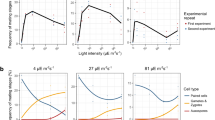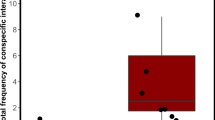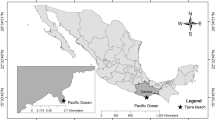Abstract
EVIDENCE for the widespread phenomenon of organismic interaction through chemicals released into the environment is summarized by Lucas1. One type of such interaction occurs between organisms of the same species. In tadpoles2, for example, the effect of such substances is to inhibit the growth of individuals exposed to sufficient concentrations. This mechanism tends to limit the number of individuals of a given species within an area and thereby also limits depletion of environmental resources.
This is a preview of subscription content, access via your institution
Access options
Subscribe to this journal
Receive 51 print issues and online access
$199.00 per year
only $3.90 per issue
Buy this article
- Purchase on Springer Link
- Instant access to full article PDF
Prices may be subject to local taxes which are calculated during checkout
Similar content being viewed by others
References
Lucas, C. E., Symp. Soc. Exp. Biol., 15, 190 (1961).
Rose, S. M., and Rose, F. C., Symp. Soc. Exp. Biol., 15, 207 (1961).
Anderson, J. M., and Johann, J. C., Biol. Bull., 115, 375 (1958).
Anderson, J. M., Biol. Bull., 102, 1 (1952).
Author information
Authors and Affiliations
Rights and permissions
About this article
Cite this article
MAGUIRE, B. Auto-inhibition of Reproduction in Cura formanii (Turbellaria). Nature 194, 892–893 (1962). https://doi.org/10.1038/194892a0
Issue Date:
DOI: https://doi.org/10.1038/194892a0
Comments
By submitting a comment you agree to abide by our Terms and Community Guidelines. If you find something abusive or that does not comply with our terms or guidelines please flag it as inappropriate.



